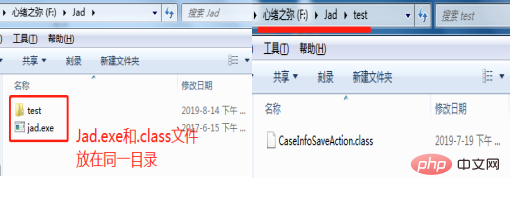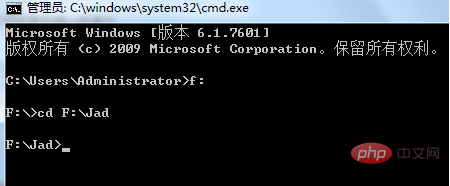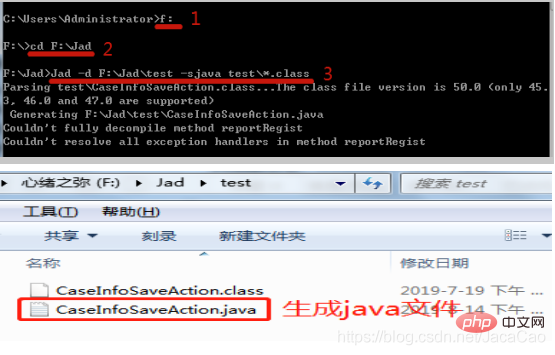How to decompile class files into java files
Apr 26, 2021 pm 02:00 PMMethod: 1. Download the "jad.exe" plug-in and place it in the same directory as the ".class" file; 2. Open the cmd command window and use the cd command to enter the directory where "Jad.exe" is located. ;3. Execute the "Jad -d java file storage path -sjava class file path" command.

The operating environment of this tutorial: windows7 system, java8 version, DELL G3 computer.
1. Tools/Materials
jad.exe decompilation plug-in
The download address can be found at:
https://varanekas.com/jad/
ttp://pan.baidu.com/s/1qWmNlww
##2. Method/step
Explanation
- Among the many JAVA decompilation tools, there are several very famous tools that use the same core Engine - JAD, which mainly includes: Front End
- Plus, mDeJava, Decafe Pro, Cavaj Java Decompiler, DJ Java
Decompiler, NMI's Java Class
Viewer and domestic JAVA source code decompilation experts, etc. . JAD itself is a command line tool without a graphical interface. Most of the above tools just add a graphical interface based on the JAD kernel. The common selection of so many products is enough to prove JAD's distinguished position in the field of JAVA decompilation.
Operation
Place jad.exe and .class files in the same directory (not necessary, optional, will be discussed later Explanation)
f: cd F:\Jad

Jad -d F:\Jad\test -sjava test\*.class Press Enter to generate the Java file

Jad -d F:\Jad\test -sjava test\*.class

Remarks: *.class * is a wildcard character, this directory is selected by default Download all .class files. If you only need to decompile a certain .class file, you can directly write the file name .class
Jad -d F:\Jad\test -sjava test\CaseInfoSaveAction. class
Jad command--Help prompt:
-a - Use JVM byte format to annotate the output -af - Same as -a, But use the full name when annotating
-clear - clear all prefixes
-b - output extra brackets (e.g., if(a) { b(); }, default: no)
-d - Specify the file directory of the output file
-dead - Attempt to decompile the dead part of the code (default: no)
-disass - Do not use bytecode to decompile (no JAVA source generated )
-f - Output the entire name, whether it is a class or a method
-ff - Output the members of the class before the method (default: after methods)
-i - Output the default of all variables Initial value
-l- Split strings into the specified number of blocks of characters (default: no)
-lnc - Annotate the output file with line numbers (default: no)
- nl - split strings using newline character (default: no)
-nodos - do not check whether the class file is written in dos mode (CR before NL, default: check)
-nocast - do not generate auxiliary files
-nocode - Do not generate method source code
-noconv - Do not convert java definers (default: do)
-noctor - Do not allow empty constructors to exist
-noinner - Turn off Support for inner classes (default: turn on)
-nolvt - Ignore table information for local variables
-nonlb - Do not output a newline before opening a parenthesis (default: do)
-o - Overwrite output without confirmation (default: no)
-p - Send decompiled code to standard output STDOUT (e.g., for piping)
-pa - Prefix used to generate all packages in the source file
-pc - prefix for classes with numeric names (default: _cls)
-pe - prefix for exception names not used (default: _ex)
-pf - prefix for fields with numeric names (default) :_fld)
-pi - use.
-pl - Prefix for local variables with numeric names (default: _lcl)
-pm - Prefix for methods with numeric names (default: _mth)
-pp - Prefix with numeric names Method parms prefix (default: _prm)
-pv - Pack fields with the same type into one line (packfields)
-r - Restore package directory structure
-s - Output file extension (default: .jad)
-space - output space between keywords (if, while, etc.) and expressions
-stat - displays the total number of classes/methods/fields processed
-t - uses spaces Indent (default: 4)
-t -Use tabs instead of spaces for indentation
-v -Display method names during decompilation
Recommended related video tutorials: Java video tutorial
The above is the detailed content of How to decompile class files into java files. For more information, please follow other related articles on the PHP Chinese website!

Hot AI Tools

Undress AI Tool
Undress images for free

Undresser.AI Undress
AI-powered app for creating realistic nude photos

AI Clothes Remover
Online AI tool for removing clothes from photos.

Clothoff.io
AI clothes remover

Video Face Swap
Swap faces in any video effortlessly with our completely free AI face swap tool!

Hot Article

Hot Tools

Notepad++7.3.1
Easy-to-use and free code editor

SublimeText3 Chinese version
Chinese version, very easy to use

Zend Studio 13.0.1
Powerful PHP integrated development environment

Dreamweaver CS6
Visual web development tools

SublimeText3 Mac version
God-level code editing software (SublimeText3)
 VSCode settings.json location
Aug 01, 2025 am 06:12 AM
VSCode settings.json location
Aug 01, 2025 am 06:12 AM
The settings.json file is located in the user-level or workspace-level path and is used to customize VSCode settings. 1. User-level path: Windows is C:\Users\\AppData\Roaming\Code\User\settings.json, macOS is /Users//Library/ApplicationSupport/Code/User/settings.json, Linux is /home//.config/Code/User/settings.json; 2. Workspace-level path: .vscode/settings in the project root directory
 How to handle transactions in Java with JDBC?
Aug 02, 2025 pm 12:29 PM
How to handle transactions in Java with JDBC?
Aug 02, 2025 pm 12:29 PM
To correctly handle JDBC transactions, you must first turn off the automatic commit mode, then perform multiple operations, and finally commit or rollback according to the results; 1. Call conn.setAutoCommit(false) to start the transaction; 2. Execute multiple SQL operations, such as INSERT and UPDATE; 3. Call conn.commit() if all operations are successful, and call conn.rollback() if an exception occurs to ensure data consistency; at the same time, try-with-resources should be used to manage resources, properly handle exceptions and close connections to avoid connection leakage; in addition, it is recommended to use connection pools and set save points to achieve partial rollback, and keep transactions as short as possible to improve performance.
 Mastering Dependency Injection in Java with Spring and Guice
Aug 01, 2025 am 05:53 AM
Mastering Dependency Injection in Java with Spring and Guice
Aug 01, 2025 am 05:53 AM
DependencyInjection(DI)isadesignpatternwhereobjectsreceivedependenciesexternally,promotingloosecouplingandeasiertestingthroughconstructor,setter,orfieldinjection.2.SpringFrameworkusesannotationslike@Component,@Service,and@AutowiredwithJava-basedconfi
 python itertools combinations example
Jul 31, 2025 am 09:53 AM
python itertools combinations example
Jul 31, 2025 am 09:53 AM
itertools.combinations is used to generate all non-repetitive combinations (order irrelevant) that selects a specified number of elements from the iterable object. Its usage includes: 1. Select 2 element combinations from the list, such as ('A','B'), ('A','C'), etc., to avoid repeated order; 2. Take 3 character combinations of strings, such as "abc" and "abd", which are suitable for subsequence generation; 3. Find the combinations where the sum of two numbers is equal to the target value, such as 1 5=6, simplify the double loop logic; the difference between combinations and arrangement lies in whether the order is important, combinations regard AB and BA as the same, while permutations are regarded as different;
 Troubleshooting Common Java `OutOfMemoryError` Scenarios
Jul 31, 2025 am 09:07 AM
Troubleshooting Common Java `OutOfMemoryError` Scenarios
Jul 31, 2025 am 09:07 AM
java.lang.OutOfMemoryError: Javaheapspace indicates insufficient heap memory, and needs to check the processing of large objects, memory leaks and heap settings, and locate and optimize the code through the heap dump analysis tool; 2. Metaspace errors are common in dynamic class generation or hot deployment due to excessive class metadata, and MaxMetaspaceSize should be restricted and class loading should be optimized; 3. Unabletocreatenewnativethread due to exhausting system thread resources, it is necessary to check the number of threads, use thread pools, and adjust the stack size; 4. GCoverheadlimitexceeded means that GC is frequent but has less recycling, and GC logs should be analyzed and optimized.
 python pytest fixture example
Jul 31, 2025 am 09:35 AM
python pytest fixture example
Jul 31, 2025 am 09:35 AM
fixture is a function used to provide preset environment or data for tests. 1. Use the @pytest.fixture decorator to define fixture; 2. Inject fixture in parameter form in the test function; 3. Execute setup before yield, and then teardown; 4. Control scope through scope parameters, such as function, module, etc.; 5. Place the shared fixture in conftest.py to achieve cross-file sharing, thereby improving the maintainability and reusability of tests.
 Understanding the Java Virtual Machine (JVM) Internals
Aug 01, 2025 am 06:31 AM
Understanding the Java Virtual Machine (JVM) Internals
Aug 01, 2025 am 06:31 AM
TheJVMenablesJava’s"writeonce,runanywhere"capabilitybyexecutingbytecodethroughfourmaincomponents:1.TheClassLoaderSubsystemloads,links,andinitializes.classfilesusingbootstrap,extension,andapplicationclassloaders,ensuringsecureandlazyclassloa
 How to work with Calendar in Java?
Aug 02, 2025 am 02:38 AM
How to work with Calendar in Java?
Aug 02, 2025 am 02:38 AM
Use classes in the java.time package to replace the old Date and Calendar classes; 2. Get the current date and time through LocalDate, LocalDateTime and LocalTime; 3. Create a specific date and time using the of() method; 4. Use the plus/minus method to immutably increase and decrease the time; 5. Use ZonedDateTime and ZoneId to process the time zone; 6. Format and parse date strings through DateTimeFormatter; 7. Use Instant to be compatible with the old date types when necessary; date processing in modern Java should give priority to using java.timeAPI, which provides clear, immutable and linear






